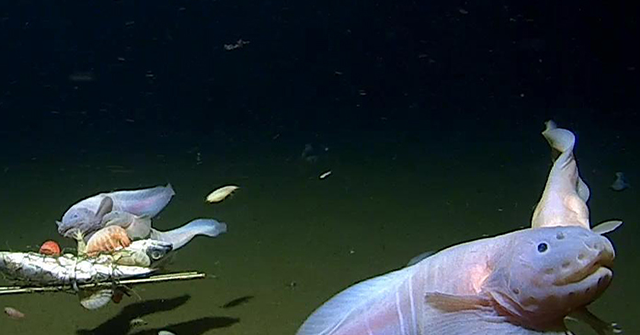Scientists from Australia and Japan have broken the record for spotting the deepest fish ever seen, as well as for catching the deepest fish ever caught.
The University of Western Australia announced researchers had broken two records – one for the deepest fish ever seen at 8,336 meters, and one for the deepest fish ever captured at 8,022 meters.
Australian and Japanese researchers spotted a snailfish of the genus Pseudoliparis in the Izu-Ogasawara Trench, and days later, the researchers managed to catch two Pseudoliparis belyaevi snailfish, according to UWA.
UWA noted the greatest depth the species had previously been seen was 7,703 meters back in 2008.
Scientists have set a new record for the deepest fish ever caught on camera – as well as the deepest catch ever made.
The juvenile fish – a type of snailfish – was filmed swimming at 8,336m in the Izu-Ogasawara Trench, south of Japan
More: https://t.co/EhcKIMXLW4 pic.twitter.com/CqtXDLHg93
— Sky News (@SkyNews) April 3, 2023
“We have spent over 15 years researching these deep snailfish; there is so much more to them than simply the depth, but the maximum depth they can survive is truly astonishing,” Professor Alan Jamieson, founder of the Minderoo-UWA Deep Sea Research Centre and chief scientist of the expedition, said.
Jamieson also observed in the UWA article that the results of the expedition tend to validate much of the existing science around high-depth aquatic environments and the organisms that inhabit them.
“The real take-home message for me, is not necessarily that they are living at 8,336m but rather we have enough information on this environment to have predicted that these trenches would be where the deepest fish would be,” he said. “[I]n fact until this expedition, no one had ever seen nor collected a single fish from this entire trench.”
Specifically, Jamieson said the prediction fish could be found at extreme depths in Izu-Ogasawara Trench was based on the relatively warm temperatures observed in the water there, Sky News reported.
“In other trenches such as the Mariana Trench, we were finding them at increasingly deeper depths just creeping over that 8,000m mark in fewer and fewer numbers, but around Japan they are really quite abundant,” he said in the UWA article.


